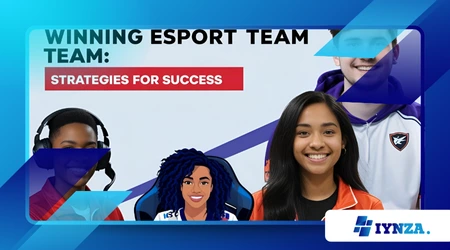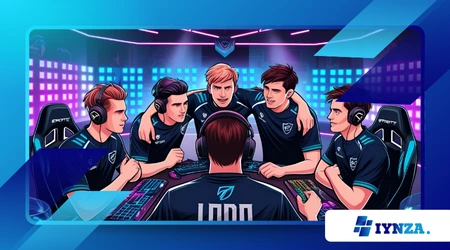How to Build a Winning Esports Team: Strategies for Success

How to build a winning esports team is a question that demands strategic planning, dedication, and a deep understanding of the competitive gaming landscape.
Anúncios
Esports has evolved into a billion-dollar industry, with millions of fans and professional players worldwide.
To achieve success, teams must focus on recruitment, training, team chemistry, strategy development, and business management.
With tournaments like The International and the League of Legends World Championship offering multi-million-dollar prize pools, competition has never been fiercer.
Understanding how to navigate this ecosystem is essential for creating a team capable of dominating the scene.
Understanding the Esports Landscape
Before assembling a team, it’s crucial to understand the industry’s structure.
Esports covers a variety of games, from first-person shooters like CS2 and Valorant to MOBAs like Dota 2 and League of Legends.
Each game has a different competitive scene, set of rules, and meta. Researching the top teams and their strategies can provide valuable insights into what makes a team successful.
Esports organizations operate similarly to traditional sports teams. They have coaches, analysts, and support staff working behind the scenes to optimize performance.
According to Newzoo, the global esports audience reached 640 million people in 2024, demonstrating the scale of the industry.
To compete at the highest level, a team must operate with the same professionalism as a traditional sports franchise.
Also Read: The Rise of Esports: How Competitive Gaming Became a Global Phenomenon
How to build a winning esports team: Defining Team Goals and Vision

Success in esports isn’t solely about winning tournaments. Some teams prioritize branding, content creation, and community engagement.
Defining a clear objective from the outset helps shape recruitment strategies and overall team dynamics.
For example, FaZe Clan and 100 Thieves have combined competitive excellence with strong media presence, leveraging content to build a loyal fanbase.
Other teams, like Team Spirit and OG, focus primarily on competitive achievements. Identifying whether your team aims to become a championship-winning squad or a content-driven brand will determine key decisions moving forward.
See how interesting: From amateur to pro: essential tips for breaking into competitive gaming
Recruiting the Right Players
Player recruitment is one of the most critical aspects of building a team. A roster should be constructed based on skill, synergy, and long-term potential.
Many successful teams scout talent from ranked leaderboards, online tournaments, and academy teams.
However, skill alone isn’t enough. Players must have strong communication abilities and the right mentality.
Toxicity and ego clashes can ruin even the most talented squads. It’s vital to assess a player’s ability to work within a team environment.
Teams like G2 Esports have built their success not only on mechanical skill but also on strong team chemistry and leadership.
A balanced roster should include a mix of experienced veterans and promising young talent.
Established players bring knowledge and composure, while younger players provide fresh perspectives and hunger for success.
+ The Art of Retro Gaming: Why Classic Games Still Matter Today
How to build a winning esports team: Building Team Chemistry
A team that lacks chemistry will struggle, regardless of individual talent. Strong relationships between players translate into better in-game coordination and resilience under pressure.
Creating an environment where players feel comfortable communicating openly is essential.
Many teams conduct regular team-building exercises, both in-game and in real life, to strengthen trust.
Team Liquid, for example, invests in mental coaching to help players develop a winning mindset and handle pressure effectively.
Conflict resolution strategies should also be in place. Differences in opinion are inevitable, but they must be managed constructively.
Leadership, whether from a captain or coach, plays a crucial role in fostering a positive team culture.
Developing Effective Strategies
Every game has a meta—optimal strategies based on the current balance of the game. Understanding the meta and adapting to shifts in gameplay dynamics is crucial for long-term success.
Professional teams analyze their own performances and study opponents to develop counter-strategies. VOD (video-on-demand) review sessions are a staple of high-level play.
Teams that fail to innovate often get left behind, as seen in the rapid evolution of strategies in games like League of Legends and Overwatch.
Flexibility is another important factor. A rigid team composition can be easily countered. Teams should cultivate diverse playstyles and be able to pivot strategies mid-tournament.
For instance, in CS2, having players who can switch between aggressive and defensive playstyles can be a game-changer.
How to build a winning esports team: Implementing a Structured Practice Regimen
Effective practice is more than just grinding ranked games. Professional teams divide their training into structured sessions, focusing on different aspects of gameplay.
Scrims (practice matches against other teams) are used to test strategies, while individual practice hones mechanics.
Reviewing match footage allows players to identify mistakes and improve decision-making.
Organizations like Cloud9 and T1 implement rigorous training schedules, ensuring players are always improving.
A good balance between practice and rest is necessary to avoid burnout. Esports players, like traditional athletes, need time to recover and maintain peak performance.
Investing in Quality Equipment
Esports is a technology-driven industry, and high-quality equipment can make a difference.
Professional players use top-tier peripherals, including high-refresh-rate monitors, mechanical keyboards, and gaming mice with low latency.
Stable internet connections and dedicated practice facilities further enhance performance.
Many top organizations invest in gaming houses or boot camps, where players can train together in an optimized environment.
| Equipment | Importance |
|---|---|
| 240Hz Monitor | Reduces input lag |
| Mechanical Keyboard | Ensures faster response times |
| High DPI Mouse | Allows for precise aiming |
| Noise-Canceling Headset | Enhances focus and communication |
Securing Sponsorships and Partnerships
Sponsorships provide essential financial support. Companies invest in teams that offer strong brand visibility and engagement.
Teams must market themselves effectively to attract sponsorships from gaming brands, energy drinks, and tech companies.
Building a compelling brand and engaging with fans through social media increases sponsorship appeal.
Organizations like Team SoloMid (TSM) have built lucrative partnerships by developing strong branding and media presence.
Promoting Your Team
Branding and marketing are crucial for long-term success. Many esports team leverage platforms like YouTube, Twitch, and TikTok to build a following.
Engaging content, such as behind-the-scenes videos and tutorials, helps create a connection with fans.
Successful teams develop merchandise lines, offering jerseys, mouse pads, and custom peripherals.
This generates additional revenue while reinforcing team identity.
| Marketing Strategy | Impact |
|---|---|
| YouTube Content | Increases fan engagement |
| Twitch Streaming | Builds a loyal community |
| Social Media Presence | Attracts sponsors and partnerships |
| Merchandise Sales | Provides additional revenue |
How to build a winning esports team: Adapting and Evolving
The esports industry is constantly evolving. Meta shifts, game updates, and new competition require teams to stay adaptable. Continuous learning is key.
Teams must invest in ongoing education, whether through hiring analysts or leveraging AI-driven performance tracking.
Organizations that fail to adapt often fall behind, as seen with former powerhouse teams struggling to maintain dominance after meta shifts.
Conclusion
How to build a winning esports team requires meticulous planning and execution.
From recruiting skilled players to fostering team chemistry and securing sponsorships, every detail matters.
Esports is a dynamic and highly competitive space where only the most well-prepared teams thrive.
Success isn’t just about talent—it’s about strategy, adaptability, and smart management.
With the right approach, any team can rise to the top and leave a lasting impact on the industry.
